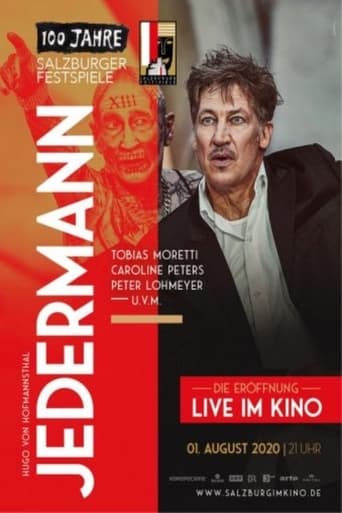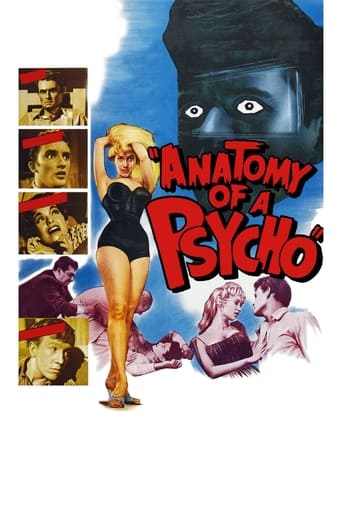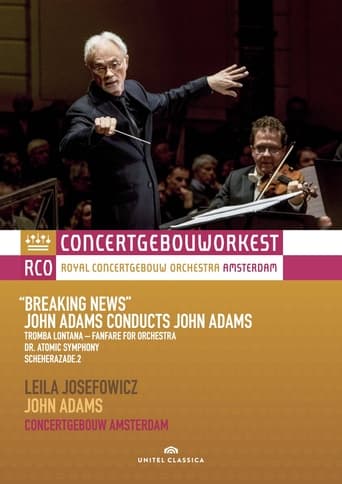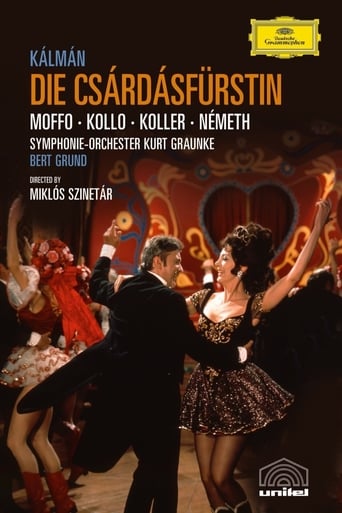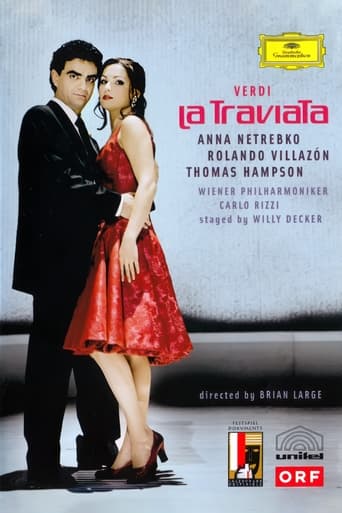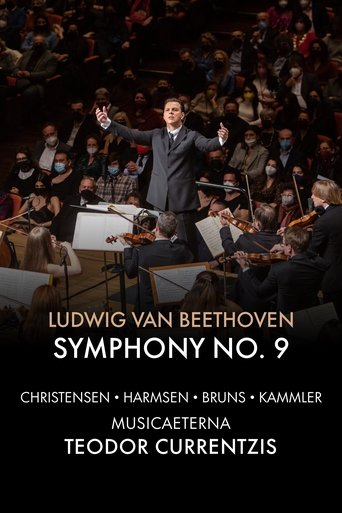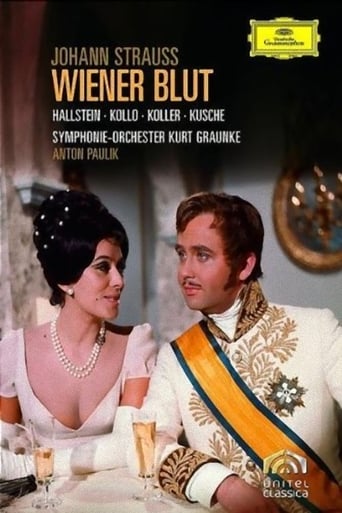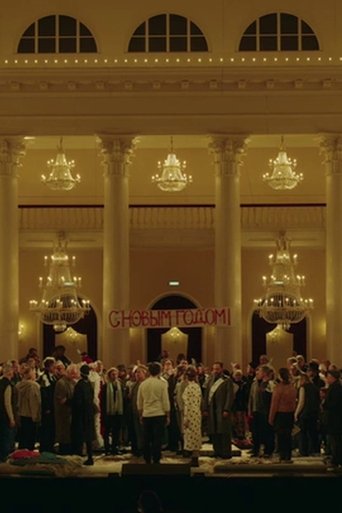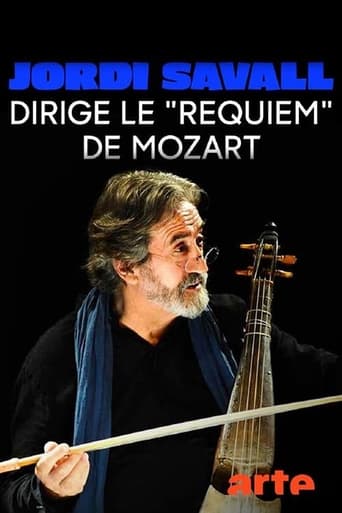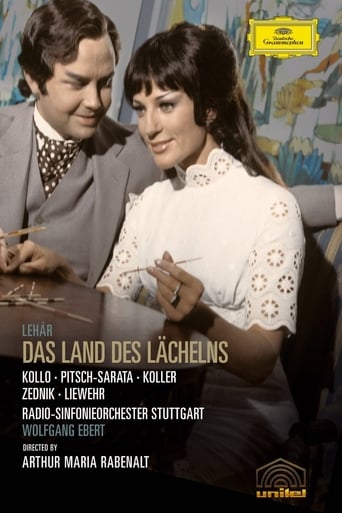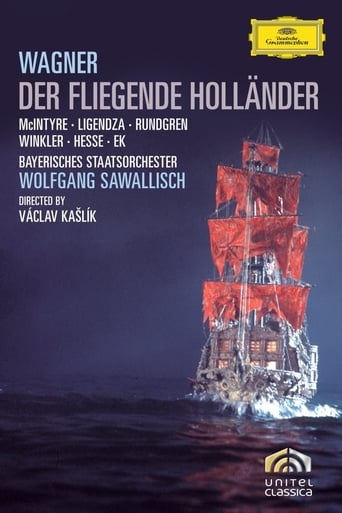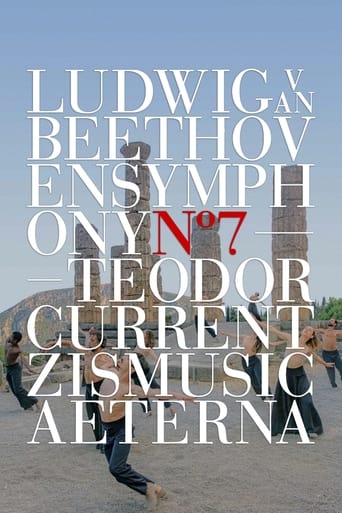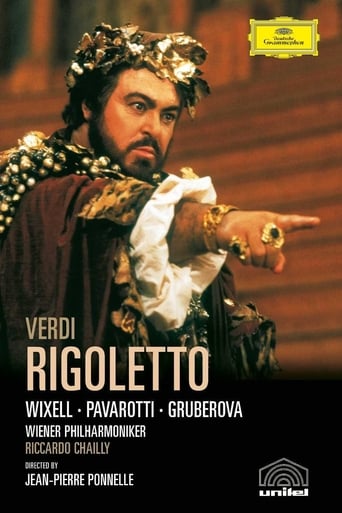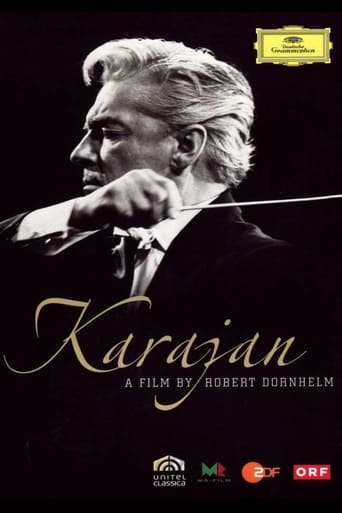Unitel
Anatomy of a Psycho 1961
The crazed brother of a condemned killer sent to the gas chamber swears vengeance on those he holds responsible for his brother's execution.
John Adams conducts John Adams 2015
Like many of John Adams’ operas, Doctor Atomic is based on recent world historical events—here, the effusive Robert Oppenheimer, “father of the atomic bomb,” anxiously awaits the bomb’s first test in Los Alamos, New Mexico. Adams adapted the work into a symphony, comprising its three main acts. In the second half of the program, Adams conducts his 2015 violin concerto, Scheherazade.2, which restages the tale of the One Thousand and One Nights heroine as a strong woman navigating a patriarchial society, incarnated by the solo violin part. The work was composed specifically for Canadian-American virtuoso Leila Josefowicz and co-commissioned by the Royal Concertgebouw Orchestra, who perform it to perfection. The evening then closes out with Tromba Lontana, an orchestral fanfare written to mark the 150th anniversary of Texas’s independence from Mexico in 1836.
Gypsy Princess 1971
Kálmán Imre's beloved operetta comes to the screen in this comedy of music, marriage and class set in Budapest and Vienna before the outbreak of the First World War, recorded at the Budapest Opera in 1963.
La traviata 2005
Violetta, a courtesan much wooed by Parisian society, organizes a grand party that is attended, amongst others, by the young Alfredo Germont. He confesses his feelings to Violetta, who is already suffering from consumption. She vacillates between genuine affection and a realistic assessment of her situation as a "fallen woman", which precludes any lasting relationship with a man. The Willy Decker production of La Traviata, recorded live at the Salzburger Festspiele in August, 2005. Anna Netrebko stars as Violetta Valéry, with Rolando Villazón as Alfredo Germont and Thomas Hampson as Giorgio Germont. Carlo Rizzi conducts the Wiener Philharmoniker.
Currentzis conducts Beethoven Symphony No. 9 2022
Ludwig van Beethoven headed for Symphony No. 9 literally his entire life. As early as the 1790s, he had an eye on Ode to Joy, perhaps the most well-known poem by Friedrich Schiller, written on the threshold of the French Revolution (1786). In his mature and, in particular, later years, the deaf composer with an acute ‘hearing vision’ increasingly distanced himself from conventional forms and genres and wrote parts beyond the possibilities of instruments of his day. He nurtured the idea of a symphony with a choir for at least several years. The history of the Ninth’s interpretations includes 200 years of staggering revelations and lingering stagnation. Performed by the musicAeterna orchestra, choir, and guest soloists under the baton of Teodor Currentzis, Beethoven’s opus magnum acquires the original poignancy and energy of a recent discovery.
Die Dollarprinzessin 1971
Mahler: Symphony No. 5 2021
For Mahler, symphonies always were a means of interpreting the most convoluted philosophical problems that couldn’t be resolved verbally. The ambitious structure of the five-part Fifth Symphony spans from the Funeral March to the roaring finale. It is a forthright attempt to resolve the tragic conflict with the surrounding world. The brilliant fourth part of the symphony, Adagietto, resembles a beautifully mysterious flower that every conductor reimagines in their own style. As one of the twentieth century’s most influential maestros, Mahler redefined the conductor’s role. For him, the conductor is just as integral to his own musical works as they are to the composer. When a maestro steps onto the podium and opens the score, he recreates musical universes from scratch. Teodor Currentzis and the musicAeterna orchestra have performed Mahler’s symphonies around the world for many years. The Fifth Symphony has earned its place as one of the highlights of the cycle.
The Martyrdom of St. Sebastian 1984
Sebastian, Chief Archer in the Roman Army, converts to Christianity. A favorite of Emperor Augustus, Sebastian's devotion to Christ eventually drives him to reject the Emperor's love, causing the Emperor to angrily order Sebastian to be shot with arrows by his fellow archers. The film retells this mystery play with a definite 'art-house' approach: an almost poetical use of language, singing, dancing, some homoerotic themes, and some special effects.
Wiener Blut 1972
An operetta with music by Johann Strauss II. However, he did not see the premiere. Wiener Blut is set at the time of the Congress of Vienna, 1814-1815, an international conference that sought to settle Europe after the upheavals of the Napoleonic Wars, and follows a traditional operetta plot full of mistaken identities. Count Balduin Zedlau, ambassador of the tiny court of Reuss-Schleiz-Greiz, is posted to Vienna. Count Zedlau is married but a real Don Juan always looking for a new encounter. Many of Strauss' compositions are used in the operetta although he did not specifically composed them for the operetta.
Sergej Prokofjew: Krieg und Frieden (Woina i mir) 2023
Sergei S. Prokofiev's monumental setting of Leo N. Tolstoy's epic novel, War and Peace. The composer and his wife Mira compressed the plot, set during Napoleon's Russian campaign, into a powerful sequence of scenes in which the love story between Natasha Rostova and Andrei Bolkonsky and the description of the Russian army's fight against the French invasion alternate in rich contrast, and at the same time are closely interwoven. All is related by the music in its fullness of splendid themes and touchingly quiet moments. Prokofiev's musical-dramatic masterpiece combines social drama and historical chronicle in its 13 scenes to form an exuberant panorama. In this production by Dmitri Tcherniakov, the opera is performed in in Munich for the first time ever.
The Land of Smiles 1974
Lehar's The Land of Smiles touches the heart as it provides unforgetable melodies from start to finish. There are no weak links in the cast. Too often, we think of operetta as musical fluff, tired cliches, and obligatory dance scenes when things start slowing down. Not so in this classic operetta. We feel the pain of loss suffered by the two main characters, who make their roles natural and believable. There is more to this work than "Yours Is My Heart Alone." There is dramatic consistency and people you find yourself caring about as much as the music, the costumes, and the colorful sets.
Der Fliegende Holländer 1975
This vivid film of Wagner's romatic opera succeeds in conveying what has famously been called "the wind that blows out at you whenever you open the score", including Daland's boat anchoring against the Sandwike cliffs, the red-sailed phantom ship, and the ghost crew rising from the dead. "Scenes that recall classic horror films... Brilliantly successful" (Nürnberger Nachrichten), "Captures the works' essence" (Süddeutsche Zeitung). With a superb cast; conducted by Wagner authority Wolfgang Sawallisch.
Beethoven: Symphony No. 7 2021
In the ancient theater of Delphi, against the backdrop of the ruins of the Temple of Apollo, musicAeterna, conducted by Teodor Currentzis, performs Ludwig van Beethoven’s 7th Symphony, in conjunction with a new choreography by Sasha Waltz and her company.
Mozart: Don Giovanni 2021
Premiered in 1787, “Don Giovanni” exposes the timeless theme of a man hovering between vitality and destruction. Neither morality nor the law can stop this serial lover in his quest to conquer all women as he places his own pleasure above all other principles. Today, the rich depth of Mozart’s masterpiece still astonishes audiences with its mix of comedy and seriousness, pleasure and love, entertainment and murder. At the helm of this new Salzburg Festival production, in a near-live broadcast from the Great Festival Hall, director Romeo Castellucci promises to focus on the ambiguity and inner turmoil of this serial lover whose immoral behaviour condemns him to a deadly solitude. The exceptional cast – featuring Italian baritone Davide Luciano (Don Giovanni), Russian soprano Nadezhda Pavlova (Donna Anna) and Finnish bass Mika Kares (the Commendatore) – is accompanied by the chorus and musicians of the musicAeterna ensemble, conducted by Vitaly Polonsky and Teodor Currentzis.
Tosca 2019
Anja Harteros excels in the title role of Michael Sturminger’s cinematic staging of Puccini’s “Tosca”, the centrepiece of Salzburg Easter Festival. Aleksandrs Antoņenko compellingly portrays Cavaradossi, while Ludovic Tézier is a thrillingly malevolent Scarpia. Christian Thielemann leads the Staatskapelle Dresden. “Tosca” is a political thriller with a heart-breaking love story that gives a vivid account of the harassment of artists, political persecution, torture and arbitrary executions. In Salzburg it is set in the Mafiosi world of modern day Rome and is “the perfect thriller … reminiscent of Scorsese’s ‘Goodfellas’” (Kleine Zeitung), a “film noir”
Verdi: Rigoletto 1982
Rigoletto is a jester in the court of the Duke of Mantua. He has a hunch-back and he's rather unattractive, but he's good at his job of humiliating the courtiers for the amusement of the Duke. The courtiers, of course, are not amused. The Duke is a ladies man who feels his life would be meaningless if he couldn't chase every skirt he sees. In fact, we learn as the opera begins that he's recently been noticing a young lady every Sunday on her way to church, and he's vowed to have his way with her. What nobody realizes is that the girl is the jester's beloved daughter, Gilda, and that Gilda has seen the Duke every Sunday and is smitten with him. Suddenly Count Monterone appears at court, furious that the Duke has seduced his daughter. Rigoletto ridicules Monterone, the Duke laughs, and Monterone casts an awful curse on both of them. Later, the courtiers discover that Rigoletto is secretly living with Gilda...
Karajan: Beauty As I See It 2008
With a career that includes a 35-year tenure as composer of the Berlin Philharmonic and record sales topping 200 million, Herbert von Karajan is one of the most legendary figures in 20th-century classical music. Comprised of archival footage, performance highlights and interviews with the likes of Anne-Sophie Mutter, Christa Ludwig and Seiji Ozawa, this retrospective chronicles the life and times of the iconic Austrian maestro.
